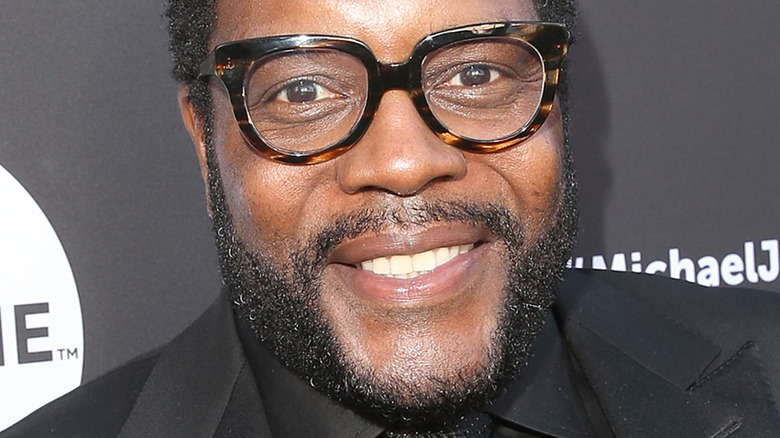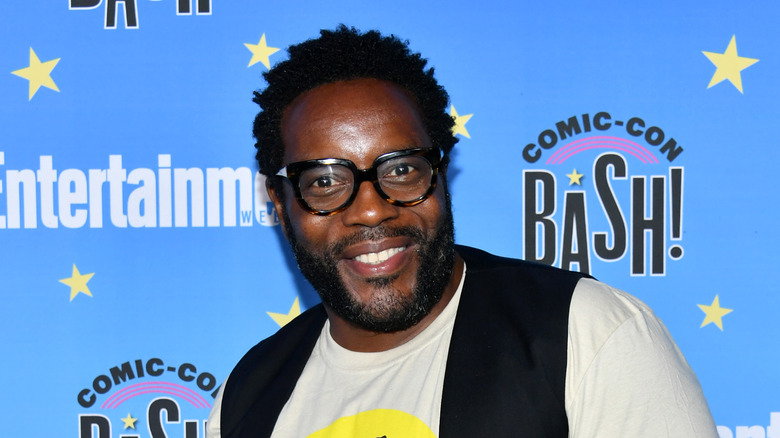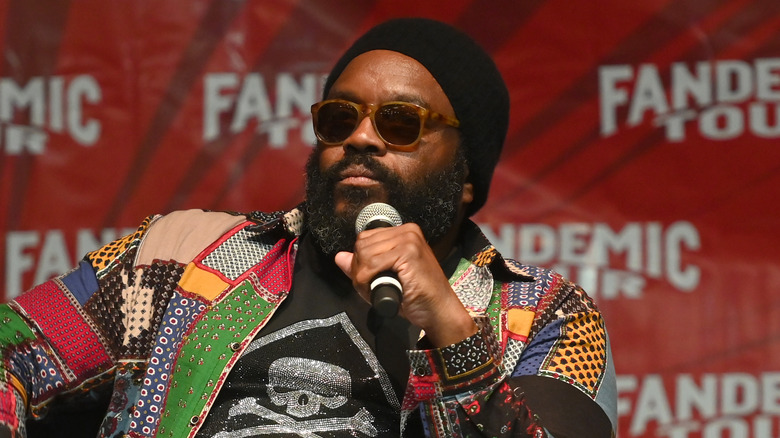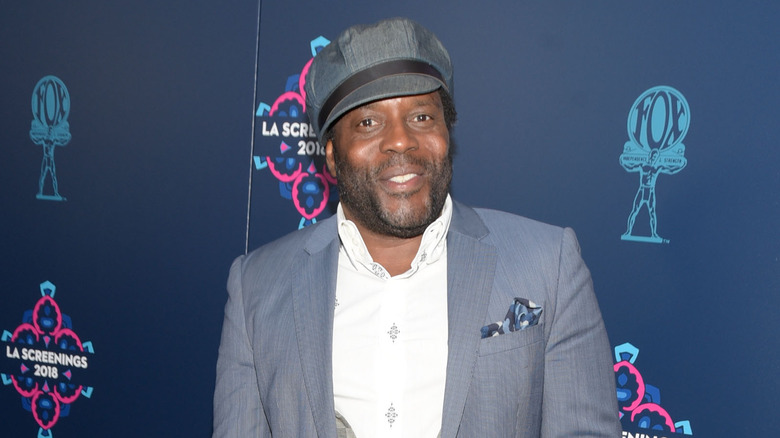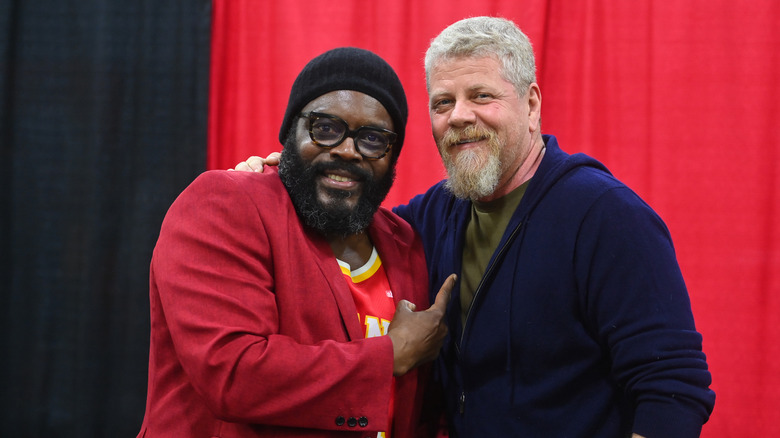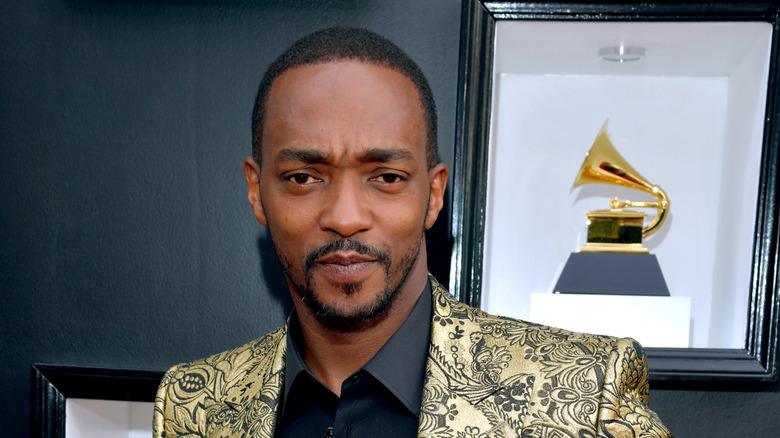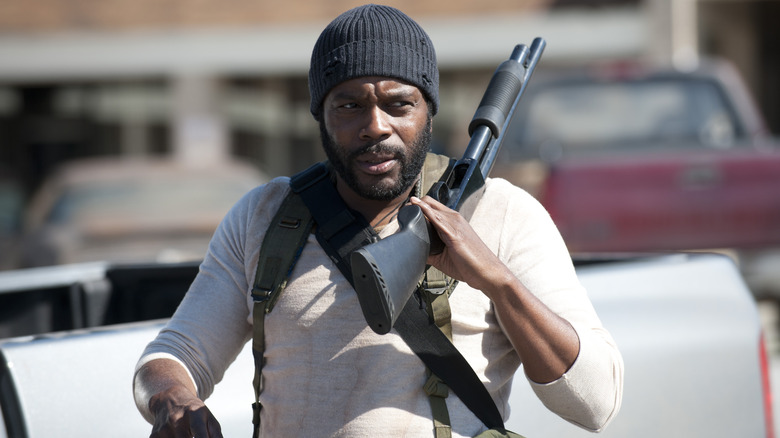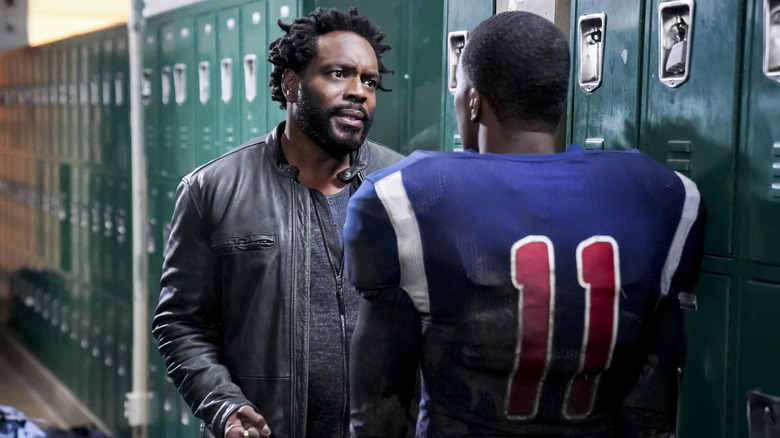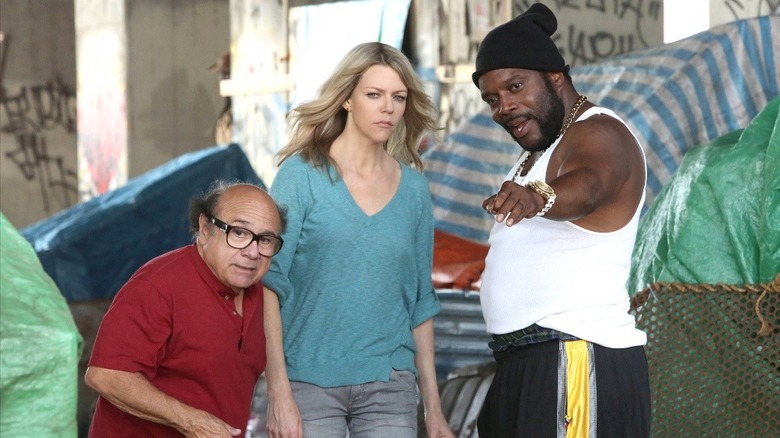Chad L. Coleman, Star Of The Wire And The Walking Dead, Talks New Podcast Humble Hollywood - Exclusive Interview
Actor Chad L. Coleman has the kind of resume most actors would give a limb for. Not only has he had central roles in numerous fan-favorite TV series, his work has spanned various genres, ranging from gritty drama to sci-fi to comedy and pretty much all stops in between. As his IMDb page demonstrates, well-known roles include Cutty on "The Wire," Z on "It's Always Sunny in Philadelphia," Tyreese on "The Walking Dead," Fred Johnson on "The Expanse," Klyden in "The Orville," Corey James in "All American," Gary in "I Hate My Teenage Daughter," Tobias Church in "Arrow" — and those are just the highlights.
Now, Coleman is expanding his talents into a whole new realm with the launch of "Humble Hollywood Podcast with Chad," a new podcast in which he's joined by guests including Seth MacFarlane ("Family Guy"), Anthony Mackie ("The Falcon and the Winter Soldier"), Charlie Day ("It's Always Sunny in Philadelphia"), Domenick Lombardozzi ("The Wire"), Michael Cudlitz ("The Walking Dead"), and NBA great Baron Davis, to name just a few.
In this exclusive interview with Nicki Swift, Coleman explains what makes "Humble Hollywood" unique among podcasts, looks back on being part of "The Walking Dead," and much more.
Why Chad L. Coleman titled his podcast Humble Hollywood
How does the title, "Humble Hollywood," reflect what you're looking to achieve with the podcast?
"Humble Hollywood" is really trying to deal with the conundrum of being in a place that gives so much, that could be so lavish, and it could be so all about me. Humility always felt to me like that's somewhere I always need to visit to really be the man that I want to be. And I don't want to show up as someone that's just so really selfish, not thinking about anybody but myself and not helping others. So that was huge for me.
The reason why it's "Humble Hollywood" is also a reminder to myself that when people come on the show, they get to silently investigate that or speak on it because we all know what outsized egos ... It's a delicate balance. So I always want to land in the neighborhood of humble and humility.
Does that reflect your own philosophy about the industry?
Yes, absolutely. Because a lot of people don't give it much importance and they don't value it, but I do. And I know a lot of other people who do too. You see what I mean? I know a lot of other people that care as much, who think about who they are as a person and also who want to engage in nurturing conversation instead of polarizing divisive conversation, where people talk at each other instead of to each other.
Humble Hollywood is a celebration of conversation
So what kind of topics do you see yourself and your guests discussing on the podcast?
I think everything's on the table. It depends on who I'm speaking to. I will always trust my instinct to ask what is on my heart or what's coming from my intellect, and we will have fun. We will have fun and we will relax. I want to make you feel like you are on the plane with me and we're just seated beside each other and we're about to take a five-hour flight to L.A. or New York and we talk. And when you do that, I've had some of the most amazing conversations. Conversation is nurturing, inspiring. You walk away feeling good about the person that yourself. That's what I'm looking for. That's what I'm after.
It's an interesting phenomenon you sort of touched on, that the art of conversation, I think, is really suffering these days because of social media technology, yet at the same time there's this rise of podcasts which sort of celebrates conversation.
That is correct. And then again, you're talking about the nature of the conversation. So you remember how there was a time when there was so much reality TV, everybody was like, "What the hell happened to scripted TV?" And along comes "The Wire."
So these podcasts are recognizing a need to have substantive conversation, to have more time with a person, to not soundbite your way through the whole deal and to really try to get to know someone. So I think it's the answer to kind of fast-food TV interview shows. It's the long form.
The actor on what his Humble Hollywood co-hosts bring to the table
So let's talk about your co-hosts on "Humble Hollywood." How did they get involved?
So I have with me the amazing Dawn Noel and the amazing Eden Sharon. So I've got an Italian-American and I have an Israeli. And so that's, you know what I'm saying, different perspectives, different energy, but we all work together really well because we're all really good friends.
That's a lot of bases covered for sure.
Yes. Because, like, we were interviewing a baseball player, I forget his name right now but he's Jewish. So [Sharon] could think of questions that relate to him in a way that I couldn't and that made the show that much more richer, that much more compelling. So yeah. I want that. And I want the inclusive team, man and women, I mean, God, in 2022 I cringe when we're still dealing with inequality. I really do. And so I want them to know, you guys are my equals, we're doing this together. I know the show's named after me, but we're a happy trio. What would Howard Stern be without [Robin Quivers]? She's amazing.
The guests on Humble Hollywood are all over the map
Looking at some of the people that you've got having on the show initially, I'm seeing people from "The Walking Dead" and "The Wire" and Seth MacFarlane, whom you worked with on "The Orville," which all makes sense. But I gotta ask you about Phil Collen from Def Leppard. How did that come about, that you got him as a guest on the podcast?
Because Helen Collen is his wife and Helen Collen used to be a dresser in the theater and we worked on a play together.
Oh wow.
Yeah. And she's amazing. And we remained friends and then I went out to their house near San Diego and hung out with them. And when I met Phil, the vibe was cool, man. We were immediately having fruitful conversation. So there was a connectivity there and he said, of course, I'd love to sit down and talk with you. Yeah. That's how that one happened. But I got an astronaut, Dan Tani. I got a celebrity psychologist ... I could talk to anybody, man. I really can. But at the same time, I was fishing from a certain pond.
That's really interesting, because people who maybe aren't in the entertainment industry might not realize the connections that you make aren't just with your co-stars onscreen, it's also with people in the crew, production area. I mean, has that been true with you?
Oh, absolutely. Absolutely. Or someone like Howard Berger from KNB special effects makeup, or Bob Munroe, head of visual effects for "The Expanse." And at the same time, just along the way, period, as a person, I'm someone who's available to talk to you. I've always been that way and people have always complimented me on my ability to strike up a conversation, carry on a conversation, with someone because I'm naturally inquisitive anyway, and I like people and I'm a talker. My whole family, we're all talkers. You got to get me off the phone. That's the truth. I'm that guy.
Anthony Mackie is one of the podcast guests on Humble Hollywood
Another person I saw you had coming up as a guest is Anthony Mackie. Had you worked with him before?
Have Mackie and I worked together? No, we just know each other. I knew him since he came out of Juilliard, and we've always been friends and had mutual respect for each other's work. I would visit him down in New Orleans, see his kids. Omar Dorsey, they're really tight. And yeah, he's just a real stand-up human being and just crazy talented and gifted and ambitious and driven and we're really good friends and he showed up for me.
Amazing. I was reading he's opening up this whole studio complex in New Orleans.
Yes. Television and film. That's when I hit him up the other day to say, "Doing big things, bro." And he says, "Thanks, my dude."
In terms of other podcasts, you kind of mentioned Howard Stern and Robin Quivers, which is a great comparison because that's sort of set the template for long-form interviews that get really deep. Are there any other podcasts you listen to that have influenced what you want to do with "Humble Hollywood."
Joe Rogan, Jemele Hill, [Mike] Tyson, [Dave] Chappelle with Talib Kweli, and Mos Def. Those are the ones.
Chad L. Coleman shares his thoughts on The Walking Dead coming to an end
I wanted to ask you about your feelings on "The Walking Dead" coming to an end this year. I mean, you were such a huge part of that show.
Well, you know what? It was a juggernaut. It ain't done. Just spinning off into less-larger meteors that will continue to swirl around.
It really was a juggernaut, particularly during the years when you were on the show, when it was at the peak of its popularity and such a huge thing. That must have been quite a unique experience for you.
Yeah, it was. It was. But at the same time, real life is happening. So sometimes you're not experiencing it to the fullest because my sister had passed away who was like a mother to me. I was in a new relationship with someone I really didn't know and we were having a child. So there was a lot personally going on at that point in time, pretty much around 2013.
But going to all the Comic-Cons and things of that nature, of course, I mean I was experiencing the industry on a level that I had never experienced before, because "The Wire" at that point was not a commercial success. So yeah, the amount of love and fandom and the ability to travel all around the world and be greeted from Santiago, Chile to Germany, the amount of love that I received was phenomenal.
He is ready and willing to enter the Marvel Cinematic Universe
Is Tyreese the character that you're most associated with, most recognized for, or are there other roles that people will associate with you?
Well, the voice of Coach from "Left 4 Dead 2," "The Wire," Cutty from "The Wire," and now more than ever Corey James from "All American."
Of all the various roles you've had, is there one that's felt closest to you, the most like your actual self, that you feel most connected with?
I think all of them do on a very ... except for, say, Tobias Church from "Arrow." I'm not an egregiously violent person. He was. And so on one level, the joy of playing that lies in it's so far from me, but most of them, I'm the instrument. So if the shoe fits, don't try to put another pair on. Just roll with it and just the technical nuance of acting, that comes with each take. But the essence of someone, yeah, I don't go into it saying I'm playing myself, but I see me as a piano and these are the notes I can play.
When you play a role for an extended period of time over a number of years, do you find yourself melding to the character more than if you're just doing like a guest spot on a show?
No, I don't think that way at all. Yes, it's ... How could I put it? If a soup has simmered, then it has a different flavor than if you first make it. It's still good, but the marinating makes it richer and it just makes it easier for you to do nuance and say a lot.
Speaking of playing a supervillain in "Arrow," do you see yourself doing any more superhero-type projects in the future?
I welcome it. From your mouth to the creator's ears. I know what Marvel's done for Anthony Mackie or all of them. You see what's going on right now with a couple of new additions into the Marvel family. These guys are doing great. I mean it's fun. I would love to do it. Oh yeah.
The unusual way he became involved with It's Always Sunny in Philadelphia
Another role of yours I've always loved was Z in "It's Always Sunny in Philadelphia." How did that come about?
Well, I auditioned for these guys for a network pilot for Fox some years ago. It was a spaceship comedy called "Boldly Going Nowhere" and I actually got the role over Carl Weathers as the security [chief] on the ship, but he was a guy that could go from zero to 60 over nothing. Like, [angrily] "Stop smacking that damn chewing gum!" So Charlie [Day] ... They loved "The Wire," man. And Charlie was such a fan of "The Wire," he's like, "This guy's drama. I don't know him being funny but I'm going to give him a chance." And I tested and they came with the notes and they were like, "You're a funny MF. You're going with us." And that's how ... and it didn't go because I asked them, "Why did you name it 'Boldly Going Nowhere?'" That was a goddamn omen. It went nowhere.
So they said, "You got to come and do 'Always Sunny,'" and then Charlie got me a role on "Horrible Bosses 2." So that dude, he and Glen [Howerton], beautiful, beautiful people, man. They have been supportive and fans all the way and the feeling is mutual.
On the subject of pilots that never made it, I think a lot of people don't realize that many actors have done so many pilots that have never seen the light of day. Do you have anything that you've done that you were really excited about that never really made it?
I think it was a pilot with Keith David and Lou Diamond Phillips and the young lady that used to be one of the leads or "New York Undercover," and I can't think of the name of it. It was a legal drama that went into the streets as well. It was sort of like a "Law & Order," but it was really good. That was one for me. Like, wow. And we aired "I Hate My Teenage Daughter," I felt like we should have gone longer. I really thought that was a wonderful show. We probably needed to be edgier, but yeah, I wish "I Hate My Teenage Daughter" had at least gotten two or three seasons. That was with Jaime Pressly.
Beyond the podcast, any other projects you've got coming up we can talk about?
Yeah. I'm working on something called "Nexus" right now, a sci-fi miniseries. It's pretty exciting stuff. I can't go into great detail on it, but it is happening for sure.
The "Humble Hollywood Podcast with Chad" officially launches on Saturday, April 16. Tickets are available for the in-person launch "Poddy" in Las Vegas, while podcast interviews will be available on all podcast streaming services following the launch.

